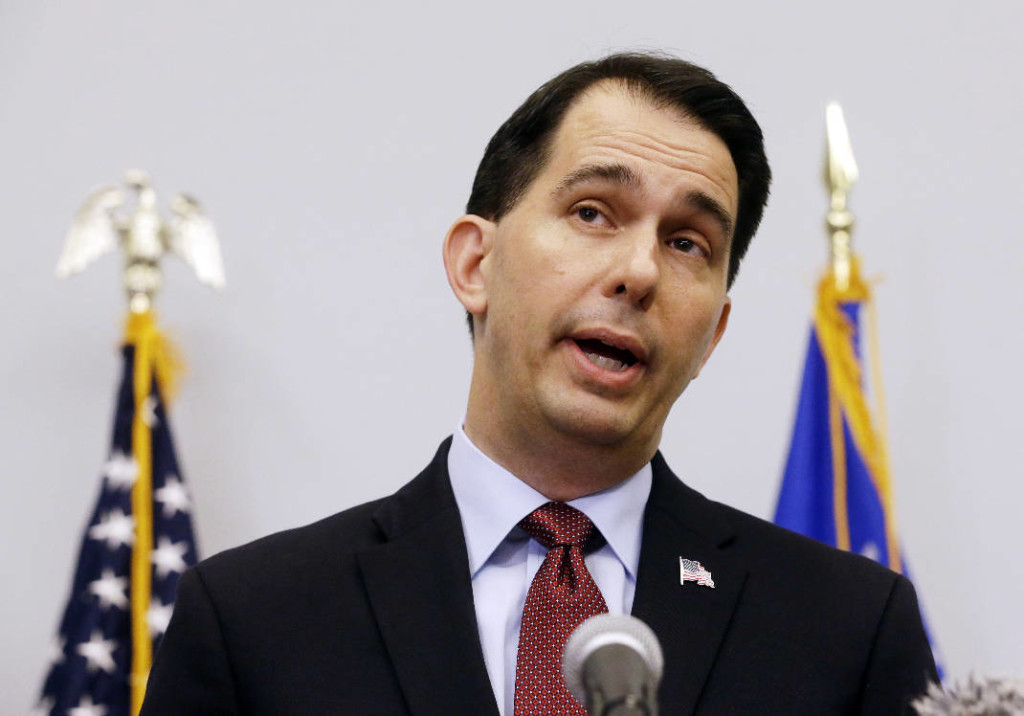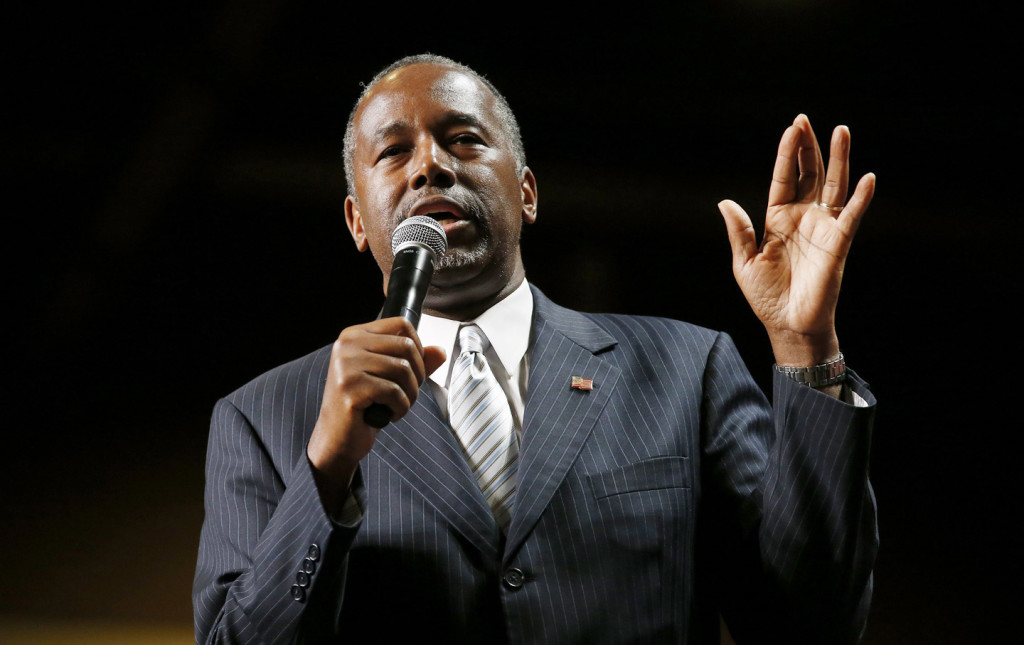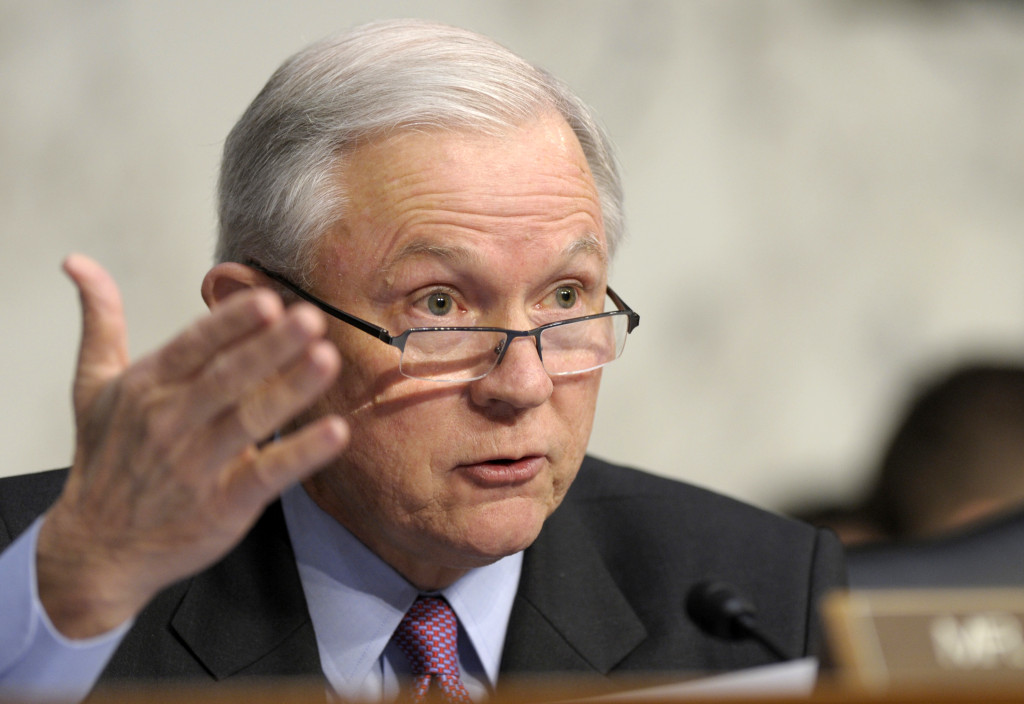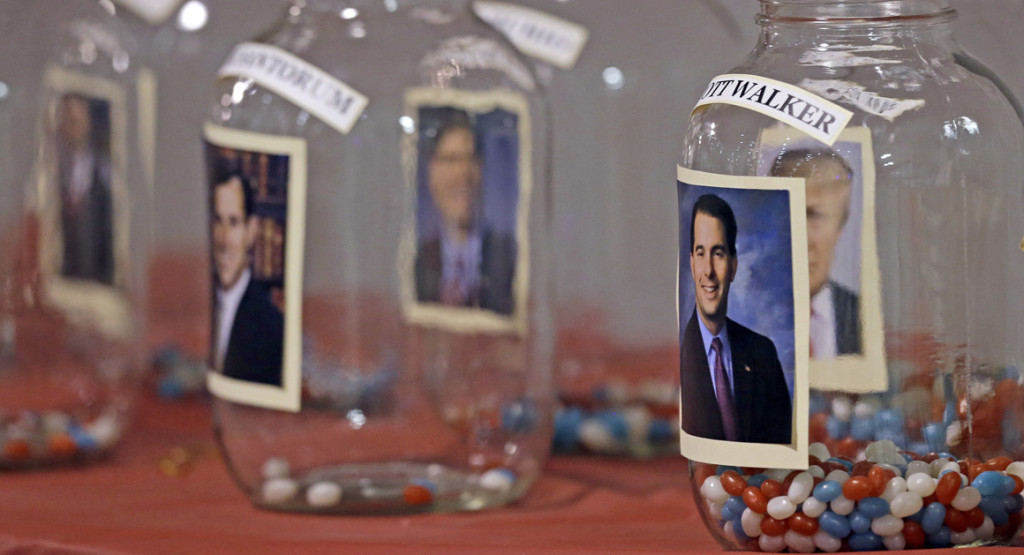Ranks thinning, traditional GOP candidates try to adapt

Scott Walker and Rick Perry entered the 2016 presidential race with a combined 18 years of experience as governors. They exited the Republican primary — the first candidates to do so — with negligible support and dwindling bank accounts. While Walker and Perry were both flawed candidates, their swift demise is a warning to others who hope to win the White House on the strength of their political resumes. And it leaves the governors and senators still in the turbulent Republican race scrambling to adapt to a political environment that is rewarding those with the least governing experience. “The country is very unhappy now, and a winning candidate must be viewed as a change agent,” said Scott Reed, a longtime Republican strategist who advises the U.S. Chamber of Commerce. So far, billionaire Donald Trump has been the biggest beneficiary of the public’s demand for an outsider. Retired neurosurgeon Ben Carson and former Hewlett-Packard CEO Carly Fiorina are also attracting voters eager to express their anger with Washington. None of the three has ever won an election. Republicans voters’ apparent desire for a political novice is striking given that conservatives have long attributed some of what they see as President Barack Obama‘s weaknesses to his inexperience when he took office. Obama spent a little less than eight years as an Illinois state senator and ran for president during his first term in the U.S. Senate. As traditional candidates among the current GOP contenders try to break through, they’re employing a two-track strategy: distance themselves from Washington’s political elite while also building a campaign that can outlast voters’ discontent if the anti-establishment mood ultimately fades. In the hours after Walker’s stunning withdrawal Monday, his experienced rivals intensified efforts to pitch themselves as Washington outsiders and political disruptors. “You cannot say that Scott Walker, Rick Perry or myself were insiders in Washington,” said Jeb Bush, the former two-term Florida governor who is also the son and brother of presidents. Advisers for Ohio Gov. John Kasich, a second-term governor and long-serving congressman, touted his efforts to challenge the status quo and even his own party. Kasich has pushed the GOP to do more to address poverty, mental illness and drug addiction, and he created an alternative to party leaders’ spending plans while serving in Congress. “You can either say you’re a change agent and have nothing to show for it but talk, or you can say you’re a change agent and have proof and results that have worked,” Kasich spokesman Scott Milburn said. Kentucky Sen. Rand Paul casts himself as “a new kind of Republican,” one who courts younger voters and minorities. Texas Sen. Ted Cruz has infuriated GOP leaders during his two-and-a-half years in Congress. And Florida Sen. Marco Rubio jumped at the opportunity to distance himself from Congress during last week’s Republican debate. “In my years in the Senate, I’ve figured out very quickly that the political establishment in Washington, D.C., in both political parties is completely out of touch with the lives of our people,” Rubio said. “That’s why I’m missing votes. Because I am leaving the Senate.” The success of anti-establishment candidates isn’t lost on Democratic front-runner Hillary Rodham Clinton. On Sunday, the former first lady, senator and secretary of state tried to pitch herself as an outsider, too. “I cannot imagine anyone being more of an outsider than the first woman president,” Clinton said in an interview with CBS’ “Face The Nation.” Walker’s campaign, however, serves as a cautionary tale for experienced candidates trying to earn outsider bona fides. As Walker grappled for ways to save his candidacy, he denied he was a career politician — despite having been in elected office for 22 years. Advisers to several GOP campaigns say they expect voters to ultimately gravitate toward experienced candidates as next year’s early primaries and caucuses draw near. Unlike Walker and Perry, who struggled to build sustainable campaigns, some of the more traditional candidates are banking on building organizations that will still be standing if the electorate’s mood does indeed shift. For Bush, that means having money — and lots of it. The former Florida governor raised $120 million for his super PAC and campaign in the first half of the year, vastly more than any of his rivals. Bush’s financial stability has already allowed him to pour $24 million into television advertising in early voting states. Rubio’s strategy is to run a lean campaign through the fall, expending as little money as possible on staff, travel and advertisements until the early primaries draw closer. “We’ve run such a lean campaign at times, taken knocks for it,” said Terry Sullivan, Rubio’s campaign manager. “But keeping control of the budget is such an important thing.” Rubio’s strategy is driven in part by necessity. His campaign and outside groups supporting his candidacy have raised about one-third of Bush’s totals. Still, Rubio’s advisers point to Walker’s financial woes as validation. Walker built a large network of staff and consultants, but quickly burned through the money he needed to keep the expensive organization afloat. Republished with permission of the Associated Press.
Republican presidential hopeful Ben Carson blames “PC culture”

Republican presidential candidate Ben Carson says “P.C. culture” is to blame for the fallout over his statement against electing a Muslim president. Carson tells reporters in Ohio on Tuesday that his view is that anyone wanting to be president must embrace the Constitution and American principles. He says anyone who does can be president. Carson adds that would also oppose a Christian for president who wanted to establish a theocracy. To recover from the controversy, the retired neurosurgeon said he’d have to fix “a P.C.”— or politically correct — “culture.” Carson called the Muslim president issue a “theoretical” question that’s distracting from important problems. Republished with permission of the Associated Press.
Conservative dissent against Obama refugee resettlement plan continues to mount

As President Barack Obama continues to seek public support for yet another controversial foreign policy initiative, in Alabama, his plan to raise the cap on refugees allowed into the country is instead garnering stern reproach from elected officials. The president, via Secretary of State John Kerry, recently rolled out a plan to gradually increase the annual cap on refugees allowed into the country from foreign soil to 100,000, up from 70,000 today. Alabama’s junior senator Sen. Jeff Sessions, on Monday took to the rostrum in the Capitol to excoriate Obama’s plan, saying the U.S. had already taken in some 1.5 million immigrants from Muslim nations since the attacks of September 11 and that given our federal deficit, that is plenty for the time being. “The U.S. has already taken in four times more immigrants than any other nation on Earth. Our foreign-born population share is set to break every known historical record,” inveighed Sessions. “Ninety percent of recent refugees from the Middle East living in our country are receiving food stamps and approximately 70 percent are receiving free healthcare and cash welfare. All of the nearly 200,000 refugees the Administration is planning to bring over the next two years would be entitled to these same benefits the moment they arrive.” “Since we are running huge deficits, every penny of these billions in costs will have to be borrowed and added to the debt,” Sessions added. He is far from alone in his opposition, especially among fellow southern Republicans. Congressman Bradley Byrne on Tuesday issued an announcement detailing his recent letter to the State Department citing concerns – echoed by Sessions and conservative columnist Rich Lowry in Monday’s New York Post among others – surrounding the nation’s limited capacity for vetting the incoming refugees. “Terrorist groups have made clear they intend to use the refugee process to infiltrate our country, and I have serious concerns about increasing the number of allowed refugees,” wrote Byrne in a letter to the department’s Bureau of Population, Rufugees, and Migration. So far, the U.S. has only accepted 1,500 refugees from Syria since the civil conflict began there four years ago. Millions have been displaced, largely looking to resettle in Turkey – which has taken in some 2 million Syrian refugees – or in continental Europe. Germany for instance, expects to take in up to 1 million refugees this year. The U.S. announced plans earlier this week to contribute some $419 million in aid to European and Middle Eastern countries which have taken the brunt of the mass exodus out of war-torn Syria.
Our deepest condolences to Fox News’ Mary Katharine Ham

The world said goodbye to one of the good guys Saturday. 34 year old White House staffer, Jake Brewer, died after suffering fatal injuries in a head-on collision after he rode his bike off of the track during the Ride to Conquer Cancer charity fundraiser bike race, where he was cycling to raise money for a friend who has cancer. His death was announced Sunday morning in a heart-breaking, heartfelt Instagram post by his wife, Montgomery native and frequent Fox News guest and conservative commentator, Mary Katharine Ham: We lost our Jake yesterday, and I lost part of my heart and the father of my sweet babies. I don’t have to tell most of you how wonderful he was. It was self-evident. His life was his testimony, and it was powerful and tender and fierce, with an ever-present twinkle in the eye. I will miss him forever, even more than I can know right now. No arms can be her father’s, but my daughter is surrounded by her very favorite people and all the hugs she could imagine. This will change us, but with prayer and love and the strength that is their companion, we can hope our heartache is not in vain– that it will change us and the world in beautiful ways, just as he did. If that sounds too optimistic at this time, it’s because it is. But there was no thought too optimistic for Jake, so take it and run with it. I will strive and pray not to feel I was cheated of many years with him, but cherish the gift of the years I had. In a life where nothing is guaranteed, Jake made the absolute, ever-lovin’ most of his time with all of us. This is a family picture we took a couple weeks ago. It was taken because Jake, as always, was ready with a camera and his immense talent. All four members of our little, growing family are in it. I can never be without him because these babies are half him. They are made of some of the strongest, kindest stuff God had to offer this world. Please pray that he can see us and we’ll all make him proud. God, I love him. Psalm 34:18, Philippians 1:3 Jacob – known as “Jake” – was a senior policy advisor to President Barack Obama in the Office of Science and Technology Policy and had previously worked as the director of external affairs at Change.org. On Sunday, President Obama offered his condolences in a statement, calling Brewer “one of the best”: I am heartbroken at the tragic loss of one of my advisors, Jake Brewer. We set out to recruit the best of the best to join their government and help us harness the power of technology and data to innovate new solutions for the 21st century. Simply put, Jake was one of the best. Armed with a brilliant mind, a big heart, and an insatiable desire to give back, Jake devoted his life to empowering people and making government work better for them. He worked to give citizens a louder voice in our society. He engaged our striving immigrants. He pushed for more transparency in our democracy. And he sought to expand opportunity for all. I’ve often said that today’s younger generation is smarter, more determined, and more capable of making a difference than I was as a young man. Jake was proof of that. Michelle and I are praying for all of Jake’s family and his many friends, most of all his wife, Mary Katharine Ham, their daughter, Georgia, and their growing family. They’ll always have a family here at the White House. “The pain and shock is devastating. Jake leaves behind an adoring wife, Mary Katharine, a beautiful toddler, Georgia, and another baby on the way,” read a GoFundMe fundraiser page set up by friends of Mary Katharine in order to help provide for their children as they grow up. She has also asked that people donate to The Travis Manion Foundation, which supports families of fallen U.S. servicemen. In approximately 26 hours, the page reached its $200,000 goal. According to Allahpundit at Hotair.com, at Mary Katharine’s insistence, funds in “excess above and beyond what’s needed for the care and education of the children will be donated to charity. That’s what kind of person she is. At a moment of supreme horror and panic, she thought of how she might do some good for others too.”
Analysis: For Scott Walker, a cascade of troubles ends campaign

For Scott Walker, it wasn’t one thing that led to the demise of his presidential campaign. It was just about everything. Financial troubles. A bloated staff. Repeated stumbles and flip flops. A candidate that professed to be a fighter, but too often, didn’t show all that much fight. The Wisconsin governor, who dropped out of the Republican race for president on Monday after only two months as a formal candidate, did so after making a litany of mistakes and missteps that could make for a “what not to do” manual for future candidates. Walker entered the 2016 race as an ostensible Republican darling, shot into the national spotlight by his victories over unions and his triumph in a recall election. With Midwestern appeal and conservative credentials, and buoyed by a rousing performance at a Republican forum in January, he rose to the top very of early polls in Iowa. That moment in Iowa proved to be Walker’s high point. As presidential primaries so often reveal, gleaming resumes don’t equal votes or big fundraising totals. And early favorites can quickly fade. “The support he had was relatively soft,” said Republican Wisconsin state Sen. Luther Olsen. “He was at the top essentially because of one speech.” To some extent, Walker is a victim of a campaign in which voters long-frustrated with politics are turning their backs on candidates with long resumes in government. Walker insisted that he, too, would “wreak havoc” on Washington, but he was drowned out by bombastic billionaire Donald Trump. But Walker’s problems were broader than a mismatch with the electorate’s mood and were foreshadowed even during his campaign’s heady early days. On a February trade mission to Europe meant to bolster his foreign policy credentials, Walker refused to answer questions about international affairs. He also punted on a question about whether he believed in evolution. That shallow foreign policy experience and inability to deftly handle questions became more pronounced as the campaign went on. He was widely panned for arguing that his experience fighting unions in Wisconsin had prepared him for defeating the Islamic State in Syria and Iraq. He said it was “legitimate” to discuss building a wall along the U.S.-Canada border. And he gave three different answers about his position on birthright citizenship in a week. Even his efforts to separate himself from Washington fell flat. At one point, he said he isn’t a career politician – despite having held elected office for 22 straight years. “The glare of the klieg lights came early for Walker and it’s hard to be prepared for that type of scrutiny when it’s your first presidential campaign,” said Kevin Madden, who advised Mitt Romney during his second run for president in 2012. Walker also suffered from strategic and structural campaign blunders. While Iowa and its kickoff caucus gave Walker the best chance to grab an early victory, his campaign built a wide network of staff and consultants in states that don’t vote until well into March. But running a national campaign is costly, and Walker and his team burned through cash faster than they could raise it. Even as donors began to grumble about the expensive operation, Walker’s team resisted scaling back or trimming salaries. Walker’s admission last week that he was shifting course and putting “all our eggs in the basket of Iowa” was a sharp departure from his campaign’s confident predictions earlier in the year about plans to rack up delegates throughout the South and Midwest late in the primary contest. In addition to refocusing on Iowa, Walker’s campaign made a last-ditch effort to energize Republicans by reaching back to the issue that had made the governor one of his party’s brightest White House hopes. He unveiled a sweeping blueprint for upending labor unions nationwide, a plan so aggressive that it was even criticized by some Republicans. Then Walker took the stage in last week’s second Republican debate. His union plan garnered no mention from moderators or rival candidates, and Walker didn’t even bring it up himself. Walker needed a standout performance in that debate, one that would validate his assertion that he was a Washington outsider with a fighting spirit. Instead, he generated the least amount of speaking time of the 11 eleven candidates on the stage and gave middling responses when attention did turn his way. The final blow came Sunday, with the release of a new CNN/ORC poll. While polls at this early stage of the race are often fickle, the message to Walker was unmistakable, according to one campaign aide, who insisted on anonymity in order to discuss the team’s internal thinking. Walker, who had once led the GOP field, was registering less than one percent of voter support. His standing as a White House candidate had been reduced to an asterisk. Republished with permission of the Associated Press.


